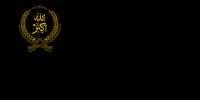National Islamic Front of Afghanistan محاذ ملی اسلامی افغانستان | |
|---|---|
 | |
| Leader | Hamed Gailani (since 2017) |
| Founder | Ahmed Gailani |
| Founded | 1979 |
| Headquarters | Kabul |
| Ideology | Afghan nationalism Pashtun Interests Royalism (formerly) |
| Political position | Right-wing |
| Religion | Sunni Islam |
| Seats in the Leadership Council | 0 / 30 |
| Party flag | |
 | |
| Website | |
| Facebook page | |
| National Islamic Front of Afghanistan | |
|---|---|
| محاذ ملی اسلامی افغانستان | |
| Leader | Ahmed Gailani |
| Dates of operation |
|
| Country | Afghanistan |
| Ideology | Afghan nationalism Anti-communism Royalism |
| Part of | Afghan Mujahideen (1979–1989) |
| Allies |
Non-state Allies: |
| Opponents | State Opponents:
Non-state Opponents: |
| Battles and wars | |
National Islamic Front of Afghanistan (Mahaz-e Milli-ye Islami-ye Afghanistan, Mahaz-i Milli-yi Islami-yi Afghanistan) is a political party in Afghanistan.[1][2] It has been led, since its founding, by members of a prominent Sufi family, the Gailani. It is primarily (but not exclusively) a Pashtun party, followers of the Sufi holy man Pir Sayyid Ahmed Gailani have a reputation for moderate thought and the traditional mystical and introspective religious currents that characterize Sufism in that sect.
- ^
John L. Esposito (2004). The Oxford dictionary of Islam. Oxford University Press. p. 92. ISBN 978-0-19-512559-7.
He was succeeded by his sons, Sher agha Jan (Sayyid Ali Gaylani, b. 1923) and the Effendi Jan (Sayyed Ahmad Gaylani, b. 1932), who left Kabul in 1978 and headed the National Islamic Front, Mahaz-e Milli-ye Islami-ye Afghanistan, in Peshawar during the jihad against the Soviet occupation.
- ^
"The 2009 Presidential and Provincial Council Electionsin Afghanistan" (PDF). National Democratic Institute. 2009. p. 49. Archived (PDF) from the original on 12 July 2011.
Four of the Paktika provincial council members are affiliated with the Mahaz Mili Islami Afghanistan party and one is affiliated with the Jamiat Islami Afghanistan party.